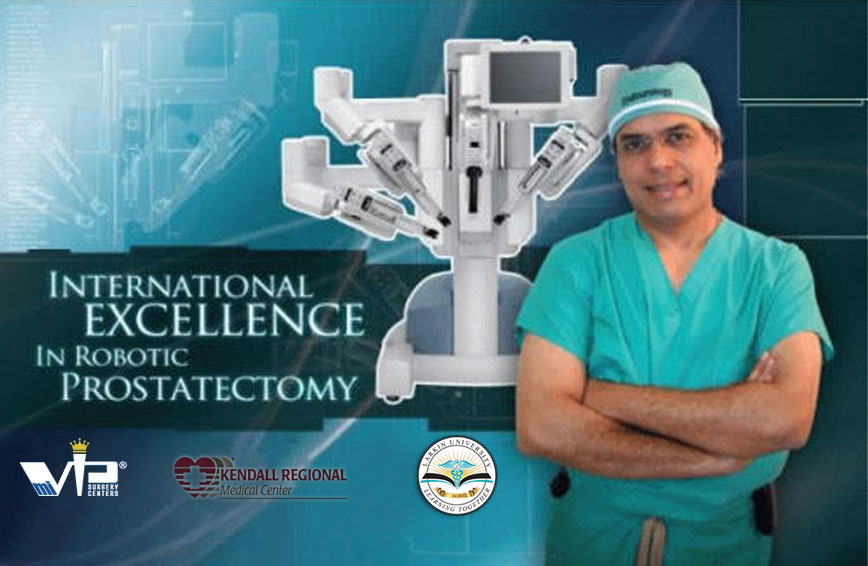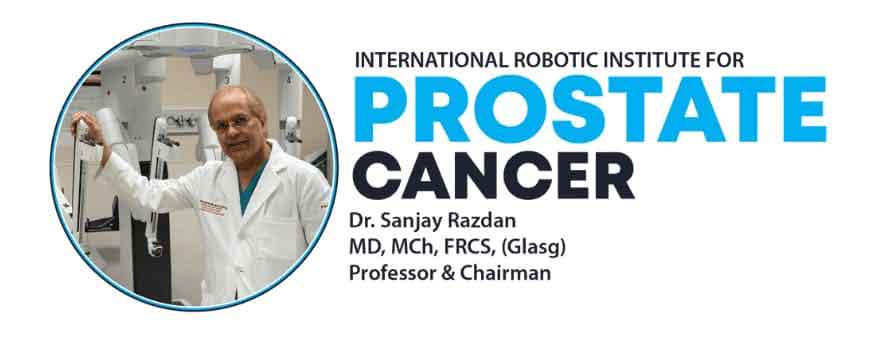Dr. Razdan is one of the most renowned Robotic Prostate Surgeons In The World! Having treated many hundreds of prostate cancer patients successfully from NJ, Dr. Razdan holds the reputation of being one of the leading Robotic Prostate surgeons in the world.
Prostate cancer not only affects the body but also affects every aspect of your life. That’s why selecting the right surgeon is crucial. New Jersey has many highly experienced and skilled urologic surgeons, offering advanced technology and innovative surgical techniques with personalized medical care. Are you searching for a trusted and skilled prostate cancer surgeon? Dr. Sanjay Razdan is a renowned prostate cancer surgeon serving many New Jersey patients. With diverse experience of 20 years, Dr. Razdan has performed over 10,000 surgeries successfully with exceptional precision and better outcomes.

Best Urologist serving prostate cancer patients from New Jersey
Dr. Razdan has received extensive advanced training in high-tech robotic surgery. He is one of the few elite Urologic surgeons across the nation to have received this training. The leading specialist has helped many Prostate Cancer Patients achieve “Earlier” Return of Sexual Function & Urinary Control after surgery!
Understands Latest Medical Trends
Dr. Razdan understands the latest trends and advancements happening in the field of prostate cancer treatment. He stays updated with the latest research studies and their outcomes. Dr. Razdan has also conducted many medical seminars nationally and internationally.
Awards
- Received many awards for his sterling contribution to the Urology society and industry.
- Award winner for original research by Endourology Society, 2014
Designation
- Serving as the Professor and Chairman of the International Robotic Institute for Prostate Cancer (world renowned institute for providing prostate cancer treatment).
- Director, Robotic Urology at MiVIP Centers of Miami
- Former Director, Urology Center of Excellence
- Former Chairman, Department of Surgery at Jackson South Hospital in Miami.
Specializations and Accreditations
- Certified by The American Board of Urology and the Endourology Society.
International Robotic Prostatectomy Institute
Renowned for being the first in the world to successfully conduct and accomplish prospective randomized studies using human amniotic membrane in post robotic radical prostatectomy patients. The last patient was enrolled in November, 2013. Today, thousands of patients have benefited from this study.
The institute offers personalized, world class care at the busiest center for Robotic Prostate Surgery in the southeastern United States.

What Is Prostate Cancer and Why Does Early Detection Matter
Prostate cancer is a type of cancer that begins in the prostate gland and is one of the most common cancers affecting men, especially those over the age of 50. While some forms of cancer grow slowly, others can be aggressive and life-altering if not detected early.
For successful treatment, it is crucial to detect the early signs of prostate cancer. At early stages, the prostate may not show any symptoms; that’s the reason why regular screening, such as Prostate-Specific Antigen (PSA), is crucial for monitoring. When detected early, prostate cancer has one of the highest survival rates, and treatment options include surgical and non-surgical methods.
How Prostate Cancer Is Diagnosed
Prostate cancer diagnosis typically starts with a PSA blood test in which the level of PSA (prostate-specific antigen) in the blood is measured. Determined PSA levels may suggest the presence of cancer, but further examination is required for confirmation.
MRI scans, digital rectal exams (DRE), and prostate biopsies are commonly used to evaluate the size and shape of the tumor.
What Are Your Treatment Options?
There are several factors on which prostate cancer treatment depends, such as PSA levels, the stage of the disease, the Gleason score, and the patient’s overall health. Treatment options include:
- Active surveillance for slow-growing cancers
- Radiation therapy uses targeted rays to eliminate cancerous cells
- Hormone therapy to lower testosterone levels to stop the growth of cancer
- Surgery to remove the prostate gland entirely
Surgical treatments are often recommended to patients with localized cancer that has not spread beyond the prostate because surgeries offer higher chances of complete treatment and long-term cancer control.
Surgery for Prostate Cancer: What You Need to Know
A prostatectomy is a type of surgical treatment that involves the removal of the prostate gland. Prostatectomy is an effective treatment for prostate cancer when diagnosed early. In conjunction with a prostatectomy, the surgeon may also remove nearby tissue or lymph nodes to determine whether or not the cancer has already spread.
There are two main types of surgery for prostate cancer: traditional open radical prostatectomy and robotic-assisted laparoscopic prostatectomy. The robotic-assisted laparoscopic prostatectomy, which involves robotic technologies, is the preferred method because of its precision and also because it is minimally invasive.
Robotic Prostate Surgery: A Game-Changer for Precision and Recovery
Robotic-assisted prostatectomy is an advanced treatment procedure that has transformed how prostate cancer is treated. With advanced robotic systems like the da Vinci Surgical System, surgeons can perform complicated procedures through small incisions with improved precision and dexterity.
Benefits of robotic prostate surgery include:
- Smaller incisions and less scarring
- Reduced blood loss
- Shorter hospital stay
- Faster recovery time
- Lower risk of complications
From Consultation to Recovery: What Your Journey Looks Like
Here is the complete step-by-step procedure for treating prostate cancer:
Step 1: Initial Consultation
Consultation with the specialist, like Dr. Razdan, for diagnosis, discussing treatment options, and creating a personalized treatment plan.
Step 2: Pre-Surgery Preparation
Patients undergo required tests, get pre-operative instructions, and receive guidance on diet and medications.
Step 3: Surgery Day
Surgery, such as robotic-assisted prostatectomy, typically takes 2 to 4 hours and is performed under general anesthesia.
Step 4: Hospital Stay
Most patients stay in the hospital for at least 1 to 2 days after surgery.
Step 5: At-Home Recovery
Patients may return to light activities within a few days, and the postoperative pain can be managed by proper care and medications.
Step 6: Follow-Up & Long-Term Care
Regular follow-ups are crucial for monitoring the recovery process and ensuring cancer does not recur.
What Makes Dr. Razdan’s Approach Unique?
Dr. Razdan believes in a patient-centered approach, takes time to evaluate patients’ conditions, and provides a personalized treatment plan with exceptional post-operative medical care. Here are some major reasons that set him apart:
- Use minimally invasive techniques
- Comprehensive pre-and post-operative care
- High patient satisfaction and success rates
- Extensive experience in robotic prostatectomies
- Personalized treatment plans
Dr. Razdan – A Light of Hope for Prostate Cancer Patients
- One of the Most Experienced and high Volume Robotic Prostate Cancer Surgeons in the World
- Performed over 10,000 robotic procedures in Urology.
- Pioneering Researcher and Surgeon on Prostate Cancer and Robotic Surgery Outcomes
- The First Surgeon in the World to USE HUMAN AMNIOTIC MEMBRANE for EARLY RETURN of ERECTILE FUNCTION after robotic prostate surgery
- First surgeon in the world to pioneer the technique of MAXIMAL URETHRAL LENGTH PRESERVATION (MULP) for EARLY RETURN OF URINARY CONTINENCE post robotic prostate surgery
- Best and most satisfactory outcomes in terms of Cancer Control, Urinary Continence and Erectile Function
- Highest rate of patients having full urinary control often within days of surgery. Around 98% are continent by 6 months
- Majority of New Jersey patients have experienced erections sufficient for sexual activity within weeks to months.(individual results may vary)
- Commendable 99% rate of patients leaving hospital within the same day.
Diagnosed with Prostate Cancer? Call us and schedule flights from New Jersey to Miami for a consultation on robotic prostatectomy with Dr. Razdan.
Book a Consultation With Dr. Razdan Today!
If you or a loved one has been diagnosed with prostate cancer, don’t wait to get the expert opinion you deserve. Schedule an appointment with Dr. Razdan by contacting his team through the given details:
Dr. Sanjay Razdan, MD, MCh, FRCS (Glasg)
Phone No: 1-305-251-8650, 1-305-251-8913
Office Hours: Monday to Friday, 8:30 AM–5 PM (Closed on weekends)
Address: International Robotic Institute for Prostate Cancer 3650 N.W. 82nd Avenue, Suite PH 501, Doral, FL 33166
Frequently Asked Questions About Prostate Cancer Surgeon New Jersey
Question 1. Will I have urinary or sexual side effects after surgery?
Answer. After surgery, temporary urinary incontinence and erectile dysfunction can occur, but expert surgeons like Dr. Razdan use nerve-sparing techniques that minimize these side effects and improve quality of life.
Question 2. What is robotic prostate surgery, and is it safe?
Answer. Robotic prostate surgery is a minimally invasive treatment procedure in which advanced robotic systems are used for greater precision and better recovery. This treatment procedure is considered safe and effective and offers faster recovery, less pain, and optimal results compared to traditional surgeries.
Question 3. Can robotic prostate surgery completely remove cancer?
Answer. If the cancer is localized, robotic prostate surgery is the right treatment option. However, the success depends on factors such as the cancer stage, location, and how early it is detected.
Question 4. What are the potential risks or side effects of prostate surgery?
Answer. There are several potential risks, such as urinary incontinence, erectile dysfunction, or infection.






